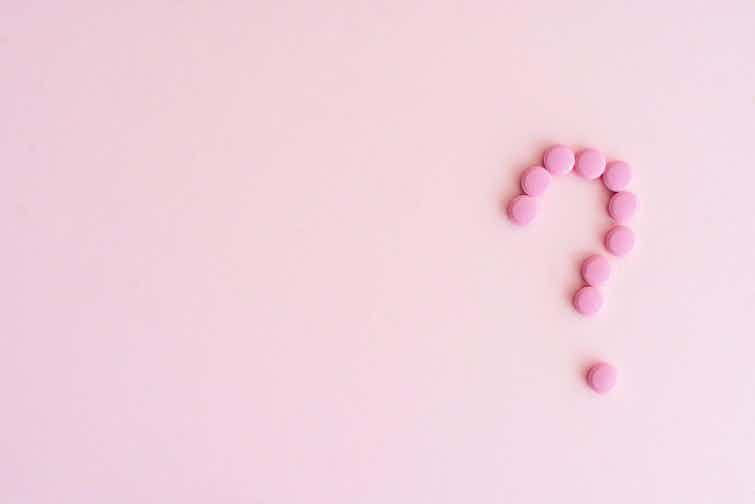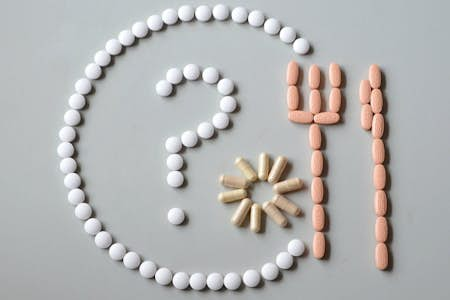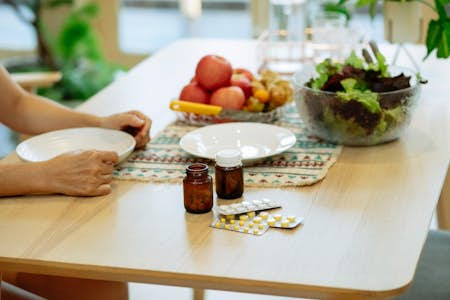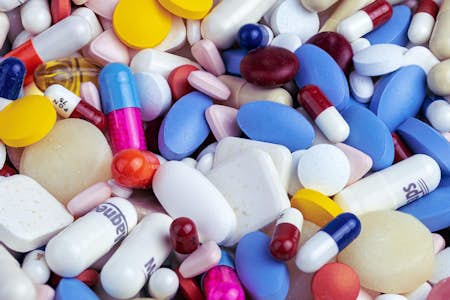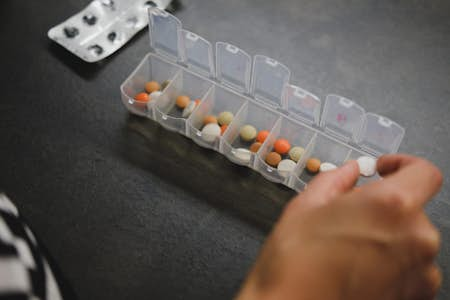There are no specific foods to avoid while taking apixaban. However, some changes to your diet and lifestyle can impact your experience of taking this blood thinner, including:
- Vitamin K rich foods, such as broccoli and kale.
- Grapefruit juice and cranberry juice.
- Some herbal supplements.
- Alcohol and recreational drugs.
Let's explore these in more detail.
Whether you're looking for the latest vitamins and supplements, want to stock up on over the counter medication, or are looking for a digital solution for your regular prescription, our providers have you covered. Compare brands below and click on your favourite to shop their best offers now!
Foods high in vitamin K, such as broccoli and kale
Vitamin K is a key player in blood clotting, performing a crucial role in synthesising clotting factors in blood vessels. You can find vitamin K in many leafy green vegetables like kale, spinach, broccoli, and Brussels sprouts.
Without sufficient vitamin K, these clotting factors would be impaired, potentially leading to difficulties forming effective blood clots and an increased risk of excessive bleeding. However, too much vitamin K might offset the blood-thinning effects, raising the risk of forming blood clots.
It's crucial to inform your healthcare provider about any significant changes in your diet or if you plan to take vitamin supplements to ensure proper management of your anticoagulation therapy. Always follow your healthcare provider's advice regarding dietary considerations while on apixaban or any anticoagulant.
Grapefruit juice and cranberry juice
Cranberry juice and grapefruit juice can interact with apixaban, the anticoagulant medication, in different ways:
- Cranberry juice may increase the risk of bleeding when consumed with anticoagulants like apixaban. Cranberry products contain compounds that can inhibit the breakdown of certain medications, potentially leading to higher drug levels in the bloodstream.
- Grapefruit juice can interact with the enzymes responsible for metabolising apixaban in the liver, potentially increasing the concentration of the drug in the bloodstream. This can enhance the anticoagulant effects and increase the risk of bleeding.
While moderate consumption of these juices is generally considered safe by the NHS, it's crucial to inform your healthcare provider about your intake, especially if it's frequent or in large amounts.
Some herbal supplements
When taking apixaban, it's important to be cautious with herbal supplements to prevent potential interactions and ensure the medication's efficacy. Certain herbal supplements may affect blood clotting and metabolism, leading to adverse effects.
Ginkgo biloba, garlic, ginger, and ginseng are examples of herbs that can increase the risk of bleeding, and their concurrent use with apixaban may increase the potential for bruising or bleeding.
You should also avoid St. John’s Wort while taking apixaban, as this herbal remedy can worsen the side effects of this blood thinner.
Like apixaban, these herbal supplements can also lessen the effectiveness of other blood thinners like rivaroxaban (Xarelto) and Brilinta. Speak to a doctor about these vitamins and herbal remedies before taking apixaban to understand what to avoid.
Alcohol and recreational drugs
When using apixaban, it's important to exercise caution when consuming alcohol. The NHS states that moderate alcohol intake, no more than 14 units per week, is usually fine. Excessive alcohol consumption can increase the risk of bleeding, which is already a potential side effect of anticoagulant medications like apixaban. Alcohol may also interact with the liver enzymes involved in metabolising apixaban, potentially impacting the drug's effectiveness.
It's crucial to avoid using recreational drugs while taking apixaban. These substances can interfere with the medication, increasing the risk of harmful effects like bleeding and often have unpredictable and severe interactions with medications.
To ensure your safety and well-being, be open and honest with your healthcare team about your alcohol intake and any recreational drug use so they can provide the best guidance and adjust your treatment plan if necessary.
Medication interactions with apixaban
Apixaban may have interactions with other prescription medications, and it is important to be aware of these. Therefore, discussing underlying medical conditions or treatments with a healthcare professional before taking these blood thinners is vital.
Common medication interactions with apixaban include:
- Drugs that treat fungal infections, such as ketoconazole or erythromycin.
- Epilepsy medication, including carbamazepine, phenytoin, and phenobarbital.
- Non-steroidal anti-inflammatory drugs (NSAIDs) such as ibuprofen, aspirin and naproxen.
- Antiplatelet medicine, such as clopidogrel.
- Other anticoagulants, such as warfarin (Coumadin), dabigatran (Pradaxa) and heparin.
It's crucial to steer clear of antiplatelet medications, as platelets play a key role in blood clotting. Using such drugs alongside apixaban can elevate the risk of bleeding.
Pregnant women should not take apixaban, and women who become pregnant while taking the drug can also be at risk. In addition, if you have a spinal tap or epidural, you are at a greater risk of developing a blood clot around your spinal cord while taking this medication.
Before starting a prescription, you must speak with a healthcare provider if you have had any previous blood clots or allergic reactions to this medication.
Unlike other strong medications, you do not need regular blood tests while taking apixaban. However, attending any scheduled international normalised ratio tests is important to monitor this blood-thinning medicine and check that it is doing its job. An international normalised ratio (INR) test is a measure of the time taken for your blood to clot.
Apixaban and painkillers
You can take paracetamol while you're taking apixaban.
Aspirin and ibuprofen increase the risk of bleeding if you are taking apixaban. Do not take them unless you have the approval of your doctor.
Are there any side effects of apixaban?
There are a few common side effects of apixaban. For example, you might experience tiredness and lack energy while taking this medication and appear paler than usual.
For some, apixaban also causes shortness of breath and noticeable heart palpitations.
The risk of bleeding more easily than usual is one of the main side effects of apixaban, including:
- Nosebleeds.
- Heavy periods.
- Bleeding gums.
- Bruising.
Due to the ability to bleed easier than usual, you may develop anaemia while taking this medication.
The side effects of tiredness and energy loss are common symptoms of anaemia. Therefore, discussing the possibility of developing anaemia with your doctor to understand how to manage it is essential.
You can reduce the risk of bleeding by taking extra care while using this medication. For example, some healthcare professionals warn against playing contact sports or engaging in activities that cause bruising or injuries. Even if these sports may not cause a severe injury, even relatively innocuous bruises or cuts are more dangerous while taking apixaban.
If you enjoy contact or high-impact sports, try to take less impactful exercise, such as walking, while taking this medication.
You should also carry your anticoagulant alert card with you all the time. This tells a healthcare professional that you are taking blood-thinning medication and could be at risk of bleeding. You should also advise your dentist you're using this medication before undergoing any dental procedures.
Understanding how to stay safe while taking apixaban
Understanding how to take apixaban, including common drug interactions and lifestyle changes that can improve your experience of this blood thinner, is crucial. It will help to reduce the risk of experiencing uncomfortable side effects while taking apixaban.
If you're already struggling with the side effects of this medication, you should speak to your GP about how to make lifestyle and diet changes. You should also discuss any herbal remedies or supplements with your doctor before taking this medication.
If you need urgent advice about any side effects while taking apixaban, call 111, or 999 in an emergency.
Image Credit: SHVETS production at Pexels

